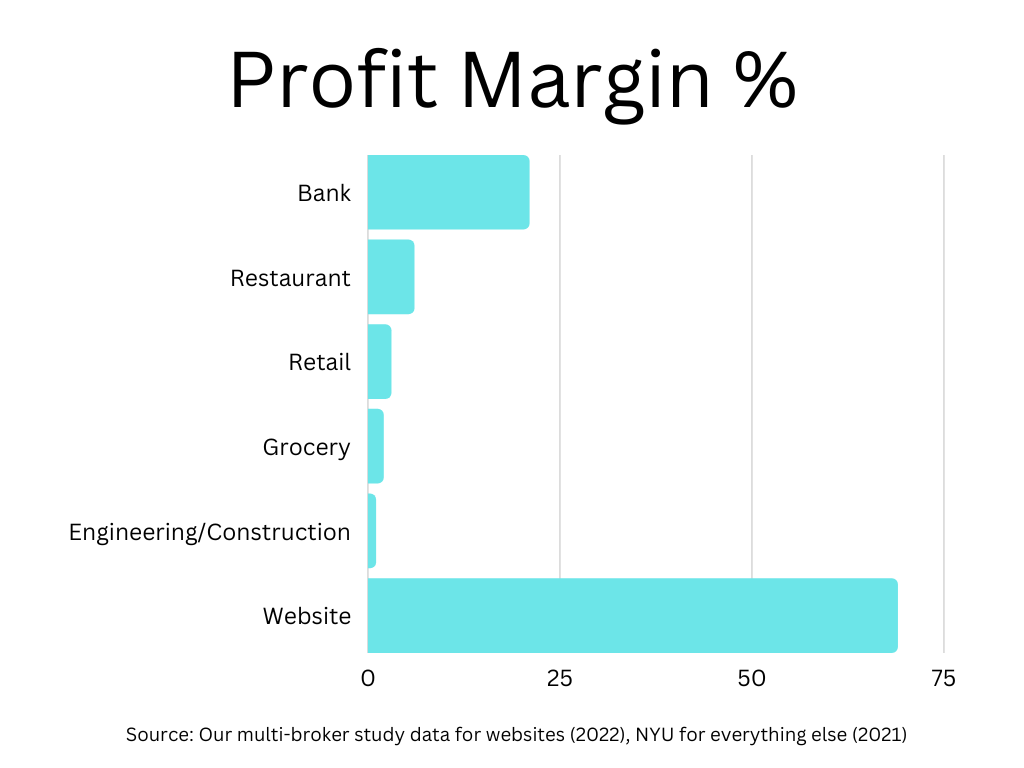Can you invest in a website? Absolutely. Medium- to long-term investing in websites is an excellent option for people who are looking for alternatives to traditional investments, such as equities and real estate. Websites have a lot of advantages over traditional investments, but they have risks and downsides as well.
So is investing in websites right for you? Is it something that is worth your money (and possibly more importantly, time and effort)? Can you make enough money investing in websites to meet your needs? In this article we do an overview of what investing in websites involves, and whether it’s right for you.
Table of Contents
- What does “investing in websites” mean?
- How does investing in websites work?
- What is the benefit of website investing?
- Can anyone invest in websites?
- How much money is needed to invest in websites?
- Where can you find websites to invest in?
- How do you get started investing in websites?
- What are alternatives to investing in websites?
- Key points
What does “investing in websites” mean?
There are actually two different strategies to investing in websites:
- A traditional equity (stock) investment in a publicly traded web-based business, such as Facebook or Twitter.
- Buying and holding a (relatively) small income-earning website, much like buying a restaurant or other business.
Both of these strategies can be lucrative, and both have their benefits and risks. But this site is focused on the latter, since there is an endless supply of information on the former strategy online.
How does investing in websites work?
When you invest in a website, you are buying that website with the expectation that you will receive income from the website going forward.
The concept is very similar to investing in any other type of small business, such as a restaurant. If you choose to invest in a restaurant, you purchase (all or part) of the restaurant from the owner. You then receive the income from the restaurant until you sell it (hopefully for a profit).
When you own a restaurant, you have certain costs, such as the cost of labor (chefs and waiters), the cost of food, and the cost of real estate. Your net income is the amount of earnings you receive after all of those costs are factored in.

Website investing works the same: you purchase a website from an owner. The website has a certain monthly earnings (we will discuss this in detail later), and has monthly expenses. Your monthly net income is the difference between the monthly earnings and the expenses. Ideally, the website increases in value over a certain period of time, so when you sell it, you also receive the profit from the sale.
What is the benefit of website investing?
You’re sitting at your office desk, contemplating starting a business. You start by spending your breaks looking for ways to make money online. Eventually, you take the step to set up a website. Over time you make a few hundred extra bucks a month. But that isn’t enough to quit your day job. It’s one thing to start a side gig and another to quit your 9 to 5 to become your own boss.
Let’s be clear; it can take a new business anywhere between two to four years to take off. The first step is turning an idea into a sellable product. Then you spend months marketing, producing, delivering, running quality control, and handling customer service. All while working a day job because your company is still in the red, with no guarantees any of it will work.
Building a website from scratch means creating content, using SEO, growing an email list, developing a brand identity, using social media, and building an audience from the ground up. And after all of that, there’s still a big chance you will fail.
The hardest part of starting an online business is building an audience. There are so many layers to this process. Not only do you need to build traffic to your site, but it needs to be the right type of traffic. It isn’t enough for people to visit your website; you also need them to buy a product after.
Even if you’re using expert SEO strategies, marketing on every social media platform, and combing through your email list, organic growth takes time. Buying a website means starting on step 15 instead of zero.
You’re basically buying a pre-packaged business plan. It includes an audience, a product, and all the systems already in place. More than that it’s already making a profit, so there’s less chance of it failing (but don’t be fooled, it’s still possible).
Can anyone invest in websites?
Technically, anyone can invest in websites. You don’t need to be an accredited investor or have any minimum net worth in order to invest.
Practically, however, investing in websites is like buying a business, which involves risk. So investors should only risk an amount that they can afford to lose.
Website prices vary widely. Small, nascent websites can be purchased for as $1000 or less. Moderately sized websites, which earn $1000 to $3000 a month can be purchased for $50,000 to $100,000, and larger websites can be priced well into the millions.
How much money is needed to invest in websites?
The amount of money that you need in order to invest in a website varies based on several factors.
First, you need enough money to acquire the website. Generally, this means that you have enough cash to pay the sale price of the site. However, there are sometimes financing options available. The SBA, for example, provides loans for certain sizes (and types) of websites. Also, sellers are sometimes willing to provide financing — especially for more expensive sites.
Second, you need to be able to support the site’s operations for a certain period. Payments for website income can be lagged by 90 days or more, so it is important to have enough money to pay all of the expenses for the site over that period.
Finally, you need a buffer — some additional money for extenuating circumstances. This can be necessary if a payment doesn’t arrive on time, or if the website is affected negatively by Google (or Amazon, Youtube, or another site).
Where can you find websites to invest in?
The website investing industry is growing rapidly, and every day there are new places to find websites to invest in.
There are about a half-dozen well-known brokers who have listings of websites that are available to purchase. These include Empire Flippers, FE International, Motion Invest, and more. There are also a few websites that list sites that are for sale. The most prominent of these is Flippa, although there are others.
In my experience, the most lucrative way to find websites to invest in is by doing Google searches and contacting owners directly. This is the way to get the best deal on sites, as you’re not competing with hundreds or thousands of other investors.
Regardless of where you purchase a website, you need to do your due diligence in order to avoid losing money. Due diligence is a complex and esoteric process, but I have written plenty of in-depth guides to help demystify all aspects of it.
How do you get started investing in websites?
Getting started in website investing can be daunting. You need to know how to value websites, perform due diligence analysis, and mitigate risks.
To help you out, I am giving away my Website Investing Beginner’s Kit, which includes a valuation worksheet, a due diligence worksheet, an income planner, and much more. All you have to do is sign up for my mailing list, and you’ll get website investing tips and insights — as well as the Website Investing Beginner’s Kit — delivered straight to your inbox.
What are alternatives to investing in websites?
There are alternatives to long-term investing in websites. If you would like to purchase a website, but you’re looking to make more money in the short term, one option is flipping.
Flipping websites works a lot like flipping real estate. There are many websites out there that have traffic but are under-monetized. A flipper looks to earn money by finding under-monetized sites and buying them. The flipper then increases the value of the site by either increasing the traffic or better monetizing the current traffic. After a period of time, the flipper can sell the site for a profit.
A smart flipper can easily make a 100%+ return over a period of six months. However, like flipping real estate, flipping websites is risky and can result in losing a lot of money quickly.
Furthermore, unlike real estate, websites don’t naturally accrue value without any upkeep, so where real estate flippers can theoretically do nothing and earn a profit, website flippers must increase their sites’ income in order to make a profit.
Although we focus on long term buy-and-hold investing on this site, we look into website flipping in-depth on other pages.
Another option is to build a website from scratch. This will take a lot longer than buying a website, so you’ll have to be patient and you’ll need to put in a lot of time. However, it can be a less risky way to attain the same recurring revenue that you would get from a website you purchased.
Key points
Investing in websites is a great alternative to traditional investments — at least for certain people. There can be a large upside to buying and holding websites, since they offer monthly income and may also accrue value. However, there are risks to investing in websites, so it’s important to be fully informed before getting involved.
This site has dozens of guides intended to take beginners through all of the details of website investing, so please read on, and let me know if you have questions!

